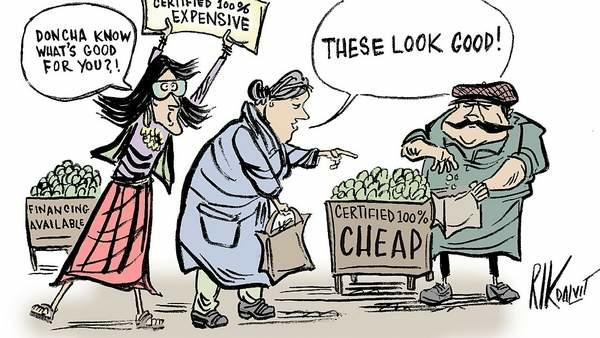You can have some trust when it comes to 'kosher', word will get out if someone is engaged in religious fraud, yet when it comes to those other food labels, companies know those are just marketing terms, no more and no less. You are a willing dupe. The US Department of Agriculture was told by President Clinton to create an official government "organic" seal, and they did, but to USDA farmers are farmers, they are not demanding that the agriculture community prove it if they want to claim their corn is blessed by a magic squirrel, and so they let organic farming trade groups, marketing departments, and farmers decide what "organic" meant.
That is why there are over 50 synthetic ingredients that can be in organic food and still be organic. Their control is also why hydroponic farms, which use no soil and no pesticides, weirdly can't be certified USDA Organic. Only a few groups will sell vegetables which use no GMOs and have no pesticides an organic sticker at all, they are that afraid of being thrown out of Big Organic.
These certifications for their arbitrary marketing designation are held by fewer than 80 groups, and those groups only make money and stay in business by selling organic certifications. With fewer than 80 certifying groups in the US, they are each "certifying" nearly 600 farms. That is nearly three farms each business day. How is it even possible? It obviously is not but that is how the organic program works. It is a belief system.

Just believe. Credit: Shutterstock
Imagine if a chemical company certified itself inside EPA and then created 'health halo' stickers for its chemicals and then gave insider companies the right to sell their health halo stickers. There would be outrage, but wealthy elites loved the USDA Organic seal. It went from being a weird cult before Clinton gave it a government endorsement to what is now a $135 billion business.
Except it really isn't. It is impossible to know how much of organic food even only has up to 50 synthetic ingredients in it. Russia and China absolutely do not care what Americans believe is organic this week. They can simply put organic stickers on food, they know little testing is done and none of it by organic wholesalers.(2) Since organic is only a marketing designation, and the US organic industry exempts lots and lots of synthetic ingredients, if a test is done and they are caught they can just reply 'that is organic in our country' and the US organic industry can't complain.(3)
Private companies have done testing and found up to 25 percent of imported food is fraudulent but even the domestic levels of fraud are unknown. No one, including USDA, tests for toxic copper sulfate or other organic pesticides, so organic food customers don't know how many chemicals were used, but even most modern chemicals are so safe and dissipate so rapidly they won't be detectable.(4) You could be eating a vegetable with an organic sticker that was grown using glyphosate and not know it.
You're at far less risk of harm than if they used more toxic copper sulfate, so that is probably a win.
USDA has said they would like to crack down on fraud, because people pay a premium, and it is a noble sentiment, but the biggest obstacle is their own National Organic Standards Board. They are essentially exempt from USDA oversight, when USDA even tried to rein them in a few years ago, to force companies to stop lying with claims that they use no pesticides, Democrats in Congress began making overt political threats.
If you want to believe organic food is healthier or more sustainable or more ethical, that is your choice, but the only intelligent label remains the one with the price.

Credit and link: Capital Press
NOTES:
(1) Non-GMO you can probably believe. Sure, Non-GMO Project just demands $3,000 and that you fill out paperwork saying you promise you don't use GMOs, but most of the 65,000 products with the sticker don't have a GMO version anyway. If you are dumb enough to buy Non-GMO Project rock salt or Snyder's pretzels with that ridiculous label, yayyyyyy capitalism.
(2) Russia pivoted to organic food sales to sell in Europe when Europe decided to ban GMOs so rapidly that even Lysenko would be skeptical.
(3) America does no surprise spot testing of domestic organic food - none - unlike normal agriculture and because they use old pesticides the organic industry exempts itself from USDA record-keeping, so every year Environmental Working Group puts out a 'dirty dozen' list to attack competitors of its organic food clients, and allied journalists who promote their claims never mention that organic pesticide residues aren't detected because no one tests for them. Including the entire organic industry, which is why fraud is so easy.
(4) California does require all chemicals in farming to be listed, the only state to do so. Using organic chemicals used compared to food produced, organic food used or uses up to 600 percent more chemicals per calorie.



Comments